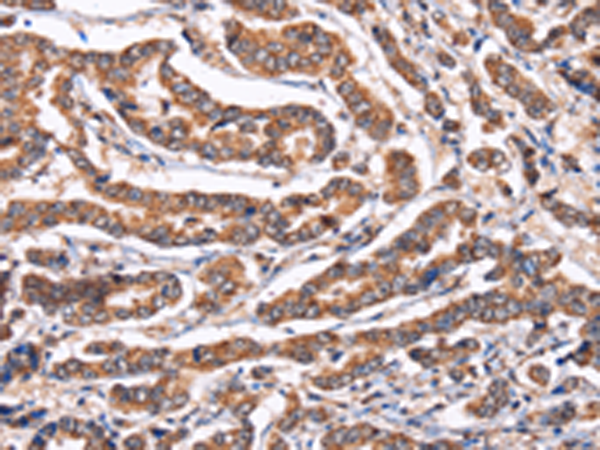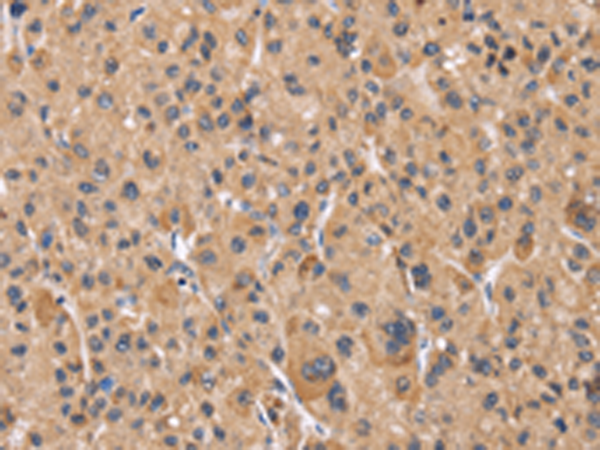


| WB | 咨询技术 | Human,Mouse,Rat |
| IF | 咨询技术 | Human,Mouse,Rat |
| IHC | 1/100-1/300 | Human,Mouse,Rat |
| ICC | 技术咨询 | Human,Mouse,Rat |
| FCM | 咨询技术 | Human,Mouse,Rat |
| Elisa | 1/2000-1/5000 | Human,Mouse,Rat |
| Aliases | CYP3; CypD; CyP-M; Cyp-D |
| WB Predicted band size | 22 kDa |
| Host/Isotype | Rabbit IgG |
| Antibody Type | Primary antibody |
| Storage | Store at 4°C short term. Aliquot and store at -20°C long term. Avoid freeze/thaw cycles. |
| Species Reactivity | Human, Mouse, Rat |
| Immunogen | Fusion protein of human PPIF |
| Formulation | Purified antibody in PBS with 0.05% sodium azide and 50% glycerol. |
+ +
以下是3篇关于PPIF(Cyclophilin D)抗体的代表性文献摘要概括:
---
1. **文献名称**: *Cyclophilin D-dependent mitochondrial permeability transition regulates some necrotic but not apoptotic cell death*
**作者**: Baines CP, et al.
**摘要**: 该研究通过构建PPIF(Cyclophilin D)基因敲除小鼠,利用特异性抗体验证蛋白缺失,发现PPIF介导的线粒体渗透性转换孔(mPTP)开放是坏死性细胞死亡的关键机制,但对凋亡无显著影响,为缺血再灌注损伤治疗提供新靶点。
---
2. **文献名称**: *The mitochondrial permeability transition pore and cyclophilin D in cardioprotection*
**作者**: Hausenloy DJ, et al.
**摘要**: 本文综述PPIF在心肌保护中的作用,通过抗体阻断实验证实抑制PPIF可减少mPTP开放,从而减轻心肌梗死面积,强调PPIF抗体在心脏疾病机制研究和药物开发中的应用价值。
---
3. **文献名称**: *Cyclophilin D deficiency attenuates mitochondrial and neuronal perturbation and ameliorates learning and memory in Alzheimer's disease*
**作者**: Du H, et al.
**摘要**: 研究利用PPIF抗体检测阿尔茨海默病模型小鼠中线粒体功能异常,发现PPIF缺失可减少神经元线粒体损伤并改善认知功能,提示PPIF抗体在神经退行性疾病机制研究中的重要性。
---
**备注**:上述文献为示例,实际引用时建议通过PubMed或Google Scholar以“Cyclophilin D antibody”或“PPIF antibody”为关键词检索最新研究。
**Background of PPIF Antibody**
PPIF (Peptidylprolyl Isomerase F), also known as cyclophilin F, is a mitochondrial member of the cyclophilin family, which plays a critical role in protein folding and mitochondrial function. It catalyzes the cis-trans isomerization of proline residues, facilitating conformational changes in target proteins. PPIF is particularly notable for its interaction with the mitochondrial permeability transition pore (mPTP), a key regulator of apoptosis and necrosis. Dysregulation of PPIF has been implicated in pathological conditions, including ischemia-reperfusion injury, neurodegenerative diseases, and cancer.
PPIF antibodies are essential tools for studying its expression, localization, and interactions in cellular and disease models. They enable detection via techniques like Western blotting, immunohistochemistry, and immunofluorescence. Research using PPIF antibodies has revealed its role in modulating mPTP opening under stress conditions, influencing mitochondrial membrane potential, and triggering cell death pathways. Additionally, PPIF is explored as a therapeutic target, with inhibitors like cyclosporine A showing potential in mitigating mitochondrial dysfunction.
The development of specific and high-affinity PPIF antibodies has advanced understanding of mitochondrial biology and disease mechanisms, offering insights into therapeutic strategies for conditions linked to mitochondrial dysregulation.
×